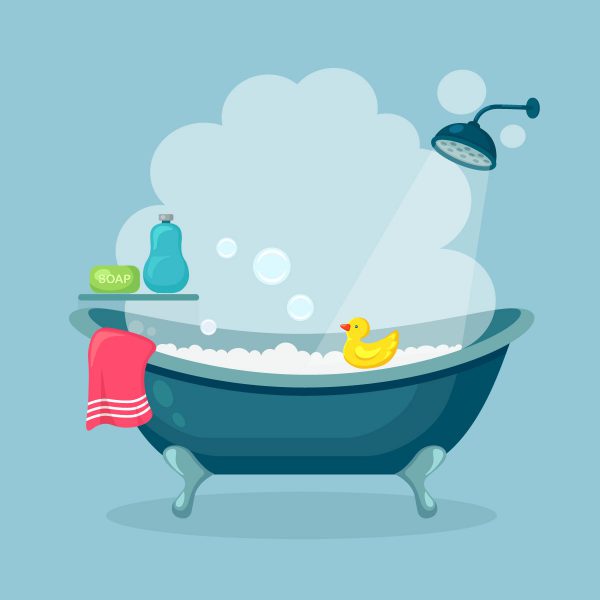Fun Fact: International Bath Day celebrates the day when the Greek scholar Archimedes discovered that an object’s volume could be accurately measured by being submerged in water. He famously yelled “Eureka!” throughout the streets of Greece.
To commemorate his achievement, teach your kids the basics of physics in the tub – empty vs. full, floating vs. sinking and more!
Here are bath time safety tips from HealthyChildren.org:
Supervision: Children can drown in only a few inches of water, so never leave a young child alone in the bath, even for a moment. If you can’t ignore the doorbell or the phone, wrap your child in a towel and take him along when you go to answer them. Bath seats and rings are meant to be bathing aids and will not prevent drowning if the child is left unattended. Never leave water in the bathtub when it is not in use. It’s also important to have anything and everything you think you’ll need within arm’s reach before getting down to business.
Slips and falls: Install no-slip strips on the bottom of the bathtub. Put a cushioned cover over the water faucet so your child won’t be hurt if he bumps his head against it. Get in the habit of closing the lid of the toilet and get a toilet lid lock. A curious toddler who tries to play in the water can lose his balance and fall in.
Water temperature: To prevent scalding, adjust your water heater so the hottest temperature at the faucet is no more than 98.6 degrees Fahrenheit (48.9 degrees Celsius). Test the water with your wrist or elbow to check that it feels warm, not hot. When your child is old enough to turn the faucets, teach him to start the cold water before the hot.
Medicine and toiletry storage: Keep all medicines in containers with safety caps. Remember, however, that these caps are child-resistant, not childproof, so store all medicines and cosmetics high and out of reach in a locked cabinet. Don’t keep toothpaste, soaps, shampoos, and other frequently used items in the same cabinet. Instead, store them in a hard-to-reach cabinet equipped with a safety latch or locks.
Electric appliances: If you use electrical appliances in the bathroom, particularly hair dryers and razors, be sure to unplug them and store them in a cabinet with a safety lock when they aren’t in use. It is better to use them in another room where there is no water. An electrician can install special bathroom wall sockets (ground-fault circuit interrupters) that can lessen the likelihood of electrical injury when an appliance falls into the sink or bathwater.


TELL US WHAT YOU THINK (0)